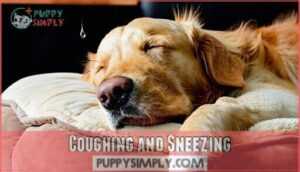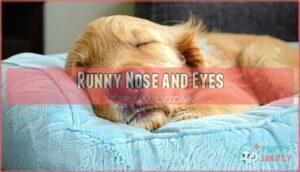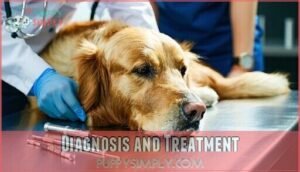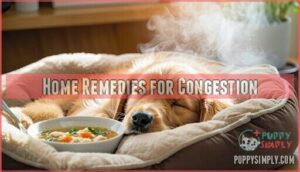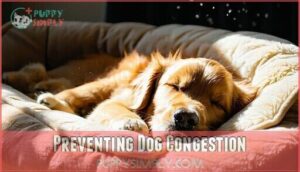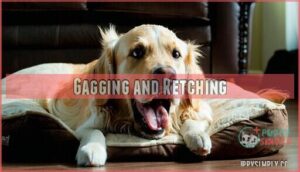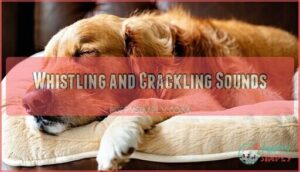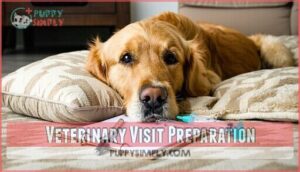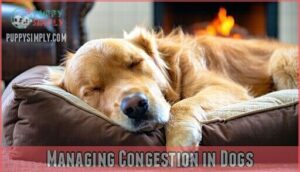This site is supported by our readers. We may earn a commission, at no cost to you, if you purchase through links.
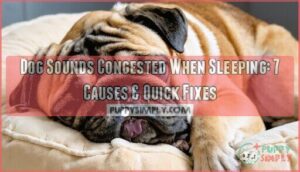 When your dog sounds congested when sleeping, you’re likely hearing blocked nasal passages from allergies, infections, or breed-specific breathing issues.
When your dog sounds congested when sleeping, you’re likely hearing blocked nasal passages from allergies, infections, or breed-specific breathing issues.
Flat-faced breeds like bulldogs naturally struggle with airflow due to their compressed airways.
Common causes include seasonal allergies, viral infections, or chronic respiratory conditions.
You’ll notice snoring, wheezing, or labored breathing during rest.
While occasional congestion might seem normal, persistent symptoms warrant veterinary attention.
Simple remedies like humidified air and proper hydration can help, but don’t ignore worsening signs like open-mouth breathing or extreme fatigue.
Understanding the specific sounds and their underlying causes can help you determine the best course of action.
Table Of Contents
- Key Takeaways
- Dog Congestion Causes
- Congestion Symptoms
- Breeds Prone to Congestion
- Diagnosis and Treatment
- Home Remedies for Congestion
- Preventing Dog Congestion
- Congestion Sounds and Signs
- When to Seek Veterinary Care
- Veterinary Visit Preparation
- Managing Congestion in Dogs
- Frequently Asked Questions (FAQs)
- Should I be worried if my dog sounds congested?
- Why does my dog sound like she can t breathe when she sleeps?
- Why does my dog’s breathing sound phlegmy?
- Why does my dog make weird sounds while sleeping?
- How can I tell if my dog is having trouble breathing?
- What are the warning signs of a serious respiratory issue in dogs?
- Is there an effective treatment for a congested dog?
- Can sleeping position affect dogs congested breathing?
- Do certain dog ages experience more nighttime congestion?
- Should I wake my congested dog while sleeping?
- Conclusion
Key Takeaways
- Identify the root cause – Your dog’s congested sleep sounds stem from viral infections, allergies, breed-specific breathing issues, or chronic conditions, with flat-faced breeds like bulldogs being particularly susceptible due to compressed airways.
- Watch for warning signs – You’ll need immediate vet care if your dog shows open-mouth breathing, blue-tinged gums, persistent symptoms lasting 2-3 days, or extreme lethargy alongside the congestion.
- Try safe home remedies first – You can provide relief using humidified air (30-50% humidity), ensuring proper rest, offering warm chicken broth, and applying gentle warm compresses to their nose area.
- Prevent future episodes – You’ll reduce congestion risks by maintaining your dog’s healthy weight, keeping their sleeping area clean, using air purifiers, staying current on vaccinations, and scheduling regular vet checkups.
Dog Congestion Causes
Your dog’s congested breathing during sleep stems from several common causes that range from minor irritations to serious health conditions.
Understanding these underlying factors helps you identify whether your pet needs immediate veterinary care or simple home remedies to breathe easier.
Viral Infections
Viral infections like canine influenza, respiratory coronavirus, adenovirus type 2, parainfluenza virus, and distemper can trigger dog congestion during sleep.
When viruses attack your dog’s airways, nighttime breathing becomes a battle against inflammation and swelling.
These dog respiratory infections cause swelling and inflammation in your pup’s airways, leading to dog cold symptoms including runny nose, coughing, and sneezing.
Dog upper respiratory issues from viral infections often worsen at night when lying down, which can be attributed to viral infections and lead to dog congestion.
Bacterial Infections
When viruses weaken your dog’s immune system, bacterial infections often follow.
Bordetella bronchiseptica causes kennel cough, while other bacteria can lead to bacterial pneumonia.
These secondary infections create thick, colored discharge and persistent symptoms that worry every pet parent:
- Fever that makes your pup feel miserable
- Loss of appetite leaving food bowls untouched
- Lethargy replacing playful energy
- Thick nasal discharge instead of clear
- Persistent coughing that disrupts sleep
Antibiotic resistance makes infection prevention essential for your dog’s respiratory health. The presence of bacterial infections and persistent symptoms are key concerns for pet owners, and addressing these issues is crucial for maintaining your dog’s overall well-being.
Fungal Infections
Unlike bacterial culprits, fungal infections like Aspergillus create persistent respiratory troubles in your dog.
These systemic infections often develop from environmental exposure to contaminated soil or organic matter. You’ll notice your dog congested sleeping patterns alongside chronic coughing lasting weeks or months.
Aspergillosis in dogs is often caused by Aspergillus fumigatus, particularly in long-nosed breeds.
Fungal diagnosis requires specialized testing, and antifungal duration typically extends several months for complete treatment of these stubborn dog respiratory infections.
Seasonal Allergies
Just like people, dogs can develop seasonal allergies to environmental allergens like pollen, dust, and mold.
You’ll notice dog allergies symptoms including sneezing, watery eyes, and congestion during spring or fall.
Pollen exposure triggers inflammation in your dog’s nasal passages.
Antihistamine options, air purifiers, and natural remedies can help manage these pollen allergies effectively.
Chronic Diseases
Beyond allergies, serious health conditions can make your dog sound congested during sleep.
Heart disease and congestive failure reduce oxygen flow, causing labored breathing.
Respiratory tumors block airways, while heartworm effects damage lung function.
Obesity impact worsens these issues, especially in brachycephalic breeds prone to dog sleep apnea.
These dog lung problems require immediate veterinary attention for proper diagnosis and treatment.
Congestion Symptoms
You’ll notice several clear signs when your dog experiences congestion, ranging from obvious breathing changes to subtle behavioral shifts.
These symptoms help you identify whether your pet’s nighttime sounds indicate a minor issue or something requiring veterinary attention.
Coughing and Sneezing
When your dog’s coughing and sneezing become frequent visitors during sleep, pay attention to the cough types you’re hearing.
A dry "goose honk" signals kennel cough, while a productive cough brings up mucus.
Reverse sneezing sounds like rapid inhalations and often indicates allergies.
Common triggers include dust, pollen, or infections affecting your dog’s respiratory health and causing persistent nasal congestion.
Noisy Breathing
Several telltale breathing patterns indicate congestion in sleeping dogs.
You’ll notice labored, rapid breathing with their mouth open, creating distinct sleep sounds.
Snoring becomes more pronounced, while wheezing and crackling lung sounds emerge from airway obstruction.
Heavy breathing during sleep often accompanies whistling noises on inhalation.
Monitor your dog’s respiratory rate—persistent noisy breathing warrants attention.
Runny Nose and Eyes
Your dog’s runny nose and watery eyes often signal underlying congestion issues.
Nasal discharge can range from clear to thick and colored, while eye discharge may cause tear staining around the eyes.
These allergy symptoms frequently worsen during seasonal changes when environmental triggers peak.
Watch for these concerning signs:
- Persistent thick, yellow-green nasal discharge
- Heavy tear staining with crusty eye buildup
- Breed predisposition symptoms in flat-faced dogs
Lethargy and Loss of Appetite
Congested dogs often experience energy level changes and appetite suppression that signal underlying causes requiring attention.
You’ll notice your pup sleeping more, showing less interest in walks, and turning away from favorite foods.
These dog symptoms accompany dog nasal congestion and dog breathing difficulties.
Nutritional support becomes essential, but persistent changes warrant a veterinary assessment to address the root dog congestion issues effectively, which is crucial for providing the necessary nutritional support.
Breeds Prone to Congestion
Some dog breeds face higher risks of nighttime congestion due to their physical characteristics and genetic predispositions.
You’ll find that flat-faced breeds, overweight dogs, and those with specific anatomical features often struggle more with breathing issues during sleep, which can be attributed to their physical characteristics.
Brachycephalic Breeds
Flat-faced dogs like Bulldogs, Pugs, and Boxers face unique breathing problems due to their compressed facial structure.
Their genetic predisposition creates narrowed airways that make dog snoring congestion a nightly reality.
- Breed standards emphasize flat faces but compromise respiratory function
- Dog noisy breathing sleep occurs from anatomical restrictions
- Surgical options can help severe cases of brachycephalic airway syndrome
These dog brachycephalic breeds need special attention for dog congestion in brachycephalic breeds.
These breeds are often affected by stenotic nares, which further restricts airflow.
Obesity and Respiratory Issues
Carrying extra pounds creates a perfect storm for your dog’s breathing troubles.
Obesity in dogs compresses airways, making dog snoring congestion worse during sleep.
Weight management isn’t just about looks—it’s about survival.
| Weight Impact | Breathing Solution |
|---|---|
| Airway compression | Controlled diets impact |
| Reduced lung capacity | Exercise benefits stamina |
| Joint strain limits activity | Surgical solutions available |
| Sleep apnea risks | Professional weight plans |
| Heart stress increases | Regular monitoring helps |
Anatomical Issues
Beyond weight concerns, your dog’s bone structure might be the real culprit behind those congested sounds.
Brachycephalic breeds like Bulldogs and Pugs face unique challenges with their compressed airways and narrowed nostrils.
These flat-faced breeds often develop sinus problems, laryngeal paralysis, or tracheal collapse.
Their shortened nasal passage creates breathing difficulties that worsen during sleep, making anatomical factors a primary concern.
Diagnosis and Treatment
When your dog’s congested sounds don’t improve after a few days, it’s time to visit your vet for proper diagnosis and treatment.
Your veterinarian will perform tests like physical exams, blood work, and chest x-rays to identify the cause and create an effective treatment plan.
Physical Exam and Blood Work
Your veterinary consultation begins with a thorough physical exam focusing on lung sounds and heart evaluation.
The vet will perform nasal inspection to check for blockages or discharge.
Blood analysis helps assess your dog’s overall health and identify underlying infections.
This veterinary diagnosis process gives your vet the foundation needed for proper treatment planning and guarantees nothing’s missed, ensuring a thorough physical exam.
Chest X-rays and Rhinoscopy
After your initial exam and bloodwork, your vet might recommend chest X-rays to check for heart or lung issues causing your dog’s nighttime congestion.
These X-ray findings help rule out serious conditions like heart failure or tumors. The total dog x-ray costs can vary based on several factors.
For nasal problems, rhinoscopy procedure involves a tiny camera exploring your dog’s nasal passages:
- Anesthesia risks are minimal but discussed beforehand
- Image interpretation reveals foreign objects or growths
- Cost comparison ranges from $200-800 for X-rays
- Veterinary diagnosis becomes more precise with visual evidence
Antibiotics and Antifungals
Your vet’s arsenal against dog nasal congestion includes targeted antibiotics for bacterial infections and antifungals for persistent fungal cases.
Antibiotic resistance concerns mean precise dosing matters, especially with pediatric dosage calculations.
Antifungal duration often extends weeks or months for complete treatment, and it is crucial to monitor for side effects and drug interactions while supporting your dog’s respiratory health throughout recovery to ensure a smooth and effective recovery.
Allergy Treatment and Surgery
For dogs with allergies causing congestion, your vet might recommend allergy testing to identify specific triggers.
Treatment options vary based on severity and your dog’s needs.
Common allergy management approaches include:
- Antihistamines – Daily oral medications like Benadryl or Zyrtec
- Immunotherapy – Allergy shots with 60-70% success rates
- Steroids – Short-term anti-inflammatory relief
- Surgical options – Rarely needed except for severe complications
Post-op care guarantees proper healing when surgery’s required.
Home Remedies for Congestion
You can ease your dog’s congestion at home using simple, safe methods that support their natural healing process.
These remedies focus on creating a comfortable environment while providing gentle relief from breathing difficulties, which helps to support their natural healing and ease congestion.
Rest and Hydration
After your vet determines the cause, you can support your dog’s recovery at home.
Rest is your best friend here – limit activity and provide comfortable bedding for adequate sleep.
Boost water intake to thin mucus naturally.
Offer aromatic foods like warm chicken broth to encourage eating when appetite drops.
These simple dog home remedies support healing alongside proper hydration and dog nutrition, with rest being crucial for recovery.
Humidified Air and Warm Compress
Adding moisture to your dog’s environment works wonders for congestion relief.
Set up a humidifier in their sleeping area, maintaining 30-50% humidity levels for ideal comfort.
You can also apply a warm, damp cloth gently to their nose and muzzle area.
A good option is to think about a specialized dog humidifier.
Monitor humidity carefully—too much creates mold problems, while steam from hot showers provides quick alternative relief.
Nutrition and Aromatic Food
When your congested pup turns up their nose at regular meals, aromatic appetite boosters can work wonders.
Warm chicken broth benefits recovery by providing hydration and enticing food appeal.
These dietary changes offer nutritional support while the strong scents help bypass blocked nasal passages, supporting your dog’s immune system during illness, and consider gentle, easily digestible options.
Avoiding Essential Oils and Supplements
Many well-meaning pet parents fall into holistic misconceptions about treating dog congestion naturally.
Oil toxicity poses serious risks—tea tree, cinnamon, and citrus oils can trigger respiratory problems and liver damage.
Supplement risks include dangerous medication interactions, and instead of these risky remedies, choose safe alternatives like plain humidifiers for dog breathing heavy sleep episodes.
Always prioritize vet consultation over DIY treatments.
Preventing Dog Congestion
You can stop your dog’s nighttime congestion before it starts by keeping their environment clean and maintaining their health through regular vaccinations.
Simple steps like using air purifiers, washing bedding weekly, and scheduling routine vet checkups create a foundation that prevents most respiratory issues from developing, which can be seen as a way to maintain their health and prevent congestion.
Vaccinations and Limited Exposure
Prevention through proper dog vaccinations forms your first line of defense against respiratory infections.
Vaccine schedules protect against canine influenza, kennel cough, and other airborne illnesses that cause congestion.
Smart socialization reduces exposure risks:
- Avoid overcrowded dog parks during outbreak seasons
- Skip boarding kennels with poor ventilation systems
- Research daycare facilities’ health screening policies
- Limit contact with unvaccinated dogs
Your dog’s immune system stays stronger with strategic prevention strategies.
Clean Environment and Bedding
Your dog’s sleeping area directly impacts their respiratory health. Regular washing of bedding materials removes accumulated allergens, dust mites, and pet dander that trigger congestion.
Vacuum carpets weekly and wipe surfaces to minimize dusty environment conditions. Clean bedding paired with consistent dog hygiene routines creates ideal air quality.
Consider washable, hypoallergenic fabrics for maximum allergen reduction and dust control benefits.
Hypoallergenic Shampoos and Air Purifiers
Beyond maintaining clean surroundings, you’ll want to invest in hypoallergenic shampoos and air purifiers.
Choose shampoos with oatmeal and aloe ingredients that won’t irritate sensitive skin.
Air purifier types like HEPA models effectively remove pet dander and pollen, reducing allergens by up to 99%.
Using a gentle dog shampoo can further minimize irritation.
This combo tackles dog allergies from multiple angles, helping prevent congestion triggers.
Regular Vet Check-ups
Your dog’s health deserves consistent attention through regular veterinary care.
Schedule annual visits for early detection of respiratory issues before they become serious problems.
These dog vet visits include vaccination schedules, parasite control, and dental health assessments.
Preventative care helps identify breathing concerns early, allowing for prompt treatment.
Consistent dog health monitoring prevents minor issues from escalating into congestion episodes, and ensures overall dental health assessments are performed regularly.
Congestion Sounds and Signs
You’ll notice several distinct sounds when your dog’s congested during sleep, ranging from soft snoring to harsh wheezing or crackling noises.
These respiratory sounds often worsen when your pet lies down, as gravity affects their already compromised airways and makes breathing more labored. Breathing more labored.
Snoring and Wheezing
Through the night, you’ll notice snoring and wheezing as telltale signs your dog’s dealing with congestion.
These breathing patterns reveal underlying issues affecting your pet’s comfort during sleep.
Watch for these concerning dog breathing sounds:
- Loud, persistent snoring that wasn’t there before
- Crackling wheezing during inhalation or exhalation
- Labored breathing with visible chest movement
- Whistling sounds indicating airway restriction
Sleep positions and breed predisposition influence these symptoms substantially.
Gagging and Retching
You might hear your dog gagging or retching during severe coughing fits, especially with kennel cough.
These alarming sounds often trigger panic in pet parents, but they’re your dog’s way of clearing airways.
Dog gagging typically worsens when lying down, causing labored breathing and respiratory distress.
Knowing what dog labor signs look like can help alleviate pet-owner anxiety.
Understanding these causes helps you provide proper relief and know when diagnosis becomes necessary for your congested companion.
Whistling and Crackling Sounds
High-pitched whistling and crackling sounds during sleep often signal respiratory congestion in your dog.
These noises indicate narrowed airways or fluid buildup that requires attention.
Key sound patterns to monitor:
- Crackling origins – Fluid in lungs creating wet, rattling noises
- Whistling causes – Blocked nasal passages forcing air through tight spaces
- Sound severity – Louder noises suggesting worsening breathing difficulties
Heavy or Fast Breathing
When your dog’s breathing rate increases during sleep, it’s often more concerning than simple snoring.
Rapid, shallow breaths or labored breathing can indicate respiratory effort problems that affect oxygen levels.
Unlike occasional dog snoring, persistent breathing difficulties suggest underlying causes that need attention.
| Breathing Pattern | What It Means | Action Needed |
|---|---|---|
| Fast, shallow breaths | Possible respiratory distress | Monitor closely, vet if persistent |
| Heavy, forced breathing | Airway obstruction or heart issues | Immediate veterinary attention |
| Mouth-open breathing | Severe breathing difficulties | Emergency care required |
| Irregular rhythm | Potential sleep apnea | Schedule vet consultation |
| Wheezing with effort | Inflammation or blockage | Professional evaluation needed |
Dog wheezing sleep patterns combined with increased respiratory effort often signal serious conditions requiring professional diagnosis.
When to Seek Veterinary Care
You shouldn’t wait if your dog’s congestion gets worse or doesn’t improve after two to three days of home care.
Call your vet immediately if you notice open-mouth breathing, purple or blue gums, or if your dog stops eating and seems unusually tired, as these are signs of a serious condition that requires immediate attention.
Persistent or Worsening Symptoms
Watch for symptom progression when your dog sounds congested when sleeping—if breathing difficulties in dogs worsen over 2-3 days, it’s time for veterinary care.
Chronic congestion that doesn’t respond to home remedies signals treatment failure.
Urgent signs include persistent coughing, increased respiratory distress, or when dog congestion symptoms interfere with normal activities like eating or playing.
Emergency Care for Difficulty Breathing
When your dog’s breathing becomes labored or distressed, time becomes your greatest enemy.
Time is your greatest enemy when your dog struggles to breathe—act fast.
These emergency signs demand immediate veterinary attention:
- Blue tongue or gums indicating oxygen deprivation
- Collapsing dog episodes during breathing struggles
- Extreme dog respiratory distress with panic-like behavior
- Dog labored breathing that doesn’t improve with rest
- Pet breathing difficulties accompanied by weakness or confusion
Don’t wait—emergency vet care saves lives.
Open-Mouth Breathing or Belly Breathing
Beyond severe breathing difficulty, watch for open-mouth breathing or belly breathing in your dog.
These emergency signs indicate critical symptoms requiring immediate action. When your dog sounds congested when sleeping and shows mouth breathing or their abdomen pumps with each breath, you’re witnessing dog respiratory distress.
This veterinary urgency demands professional intervention to prevent life-threatening complications.
Signs of Fatigue or Abnormal Behavior
Sudden lethargy in your congested pup signals trouble brewing beneath the surface.
When your dog sounds congested when sleeping and shows appetite changes, behavioral shifts, or unusual restlessness, don’t wait it out.
Hiding behavior often screams distress louder than any cough.
Monitor sleeping patterns closely—fatigue combined with abnormal behavior demands immediate veterinary attention before symptoms escalate dangerously.
Veterinary Visit Preparation
You’ll want to gather specific information about your dog’s symptoms before heading to the vet’s office.
Record when the congestion occurs, how long it’s lasted, and any changes in your dog’s eating, drinking, or energy levels to help your veterinarian make an accurate diagnosis.
What to Expect During The Visit
Your vet will start with an exam focus on your dog’s lungs, heart, and nasal passages.
They’ll discuss diagnostic options like blood work or chest X-rays based on symptoms.
Expect a thorough treatment explanation covering medication choices and recovery timelines.
The cost discussion will outline expenses for dog congestion diagnosis and veterinary care, including a discussion on follow-up appointments to monitor your pup’s progress.
Diagnostic Tests and Treatment Plans
Your vet will likely run several tests to pinpoint what’s causing your dog’s congestion.
Blood cultures and rhinoscopy help achieve diagnostic accuracy for infections, while CT scans reveal structural issues.
Treatment costs vary depending on severity – antibiotics for bacterial infections, antifungal drugs for fungal cases, or antihistamines for allergies.
Complex cases may require specialist referrals for personalized therapies targeting your dog’s specific breathing problems.
Follow-up Care and Medication
After your vet establishes the diagnosis, you’ll receive specific prescription medications like antihistamines, decongestants, or steroids for your dog’s congestion.
Medication adherence is key—follow dosing schedules exactly. Monitor symptoms daily and watch for potential side-effects like drowsiness or stomach upset.
Long-term management often requires lifestyle adjustments, including environmental changes. Keep a symptom diary to track your pup’s progress between follow-up visits.
Annual wellness checks are important for detecting subtle health changes, so be sure to schedule them regularly with your veterinarian to guarantee optimal pet care through optimal pet care.
Managing Congestion in Dogs
You can effectively manage your dog’s congestion through simple lifestyle changes and consistent monitoring.
These practical approaches help reduce symptoms and prevent future breathing problems while supporting your pet’s overall respiratory health.
Weight Management and Diet
After your vet visit, focus on weight management since obesity worsens dog congestion.
Extra pounds strain your dog’s respiratory system, making breathing harder during sleep. Choose prescription diets like Hill’s Metabolic or Purina Pro Plan OM for healthy weight loss.
Food sensitivities can trigger congestion, so consider elimination diets. Regular exercise helps maintain ideal weight and reduces breathing difficulties.
Humidifiers and Clean Bedding
Adding a humidifier increases air moisture, helping your dog breathe easier and reducing congestion symptoms.
Choose cool-mist humidifier types to avoid burns.
You might also want to think about a specialized dog humidifier for ideal pet care.
Wash bedding materials weekly in hot water to eliminate dust and allergens that worsen breathing issues.
Replace old blankets harboring microscopic irritants, which dramatically improves air quality around your dog’s sleeping area, ensuring a healthier environment with proper care.
Monitoring Progress and Adjusting Treatment
Once you’ve set up humidifiers and clean bedding, keep a watchful eye on your dog’s breathing patterns.
Track symptoms daily, noting improvements or setbacks in their congested sounds when sleeping.
If your pup’s snoring worsens or new breathing problems emerge, contact your vet about adjusting medications.
Effective dog congestion management requires ongoing monitoring and treatment tweaks.
Long-term Care and Prevention Strategies
Three key strategies form your foundation for dog congestion prevention: consistent care, environmental control, and proactive health monitoring.
Long-term success requires dedication to these fundamentals.
- Allergy Management: Use air purifiers and hypoallergenic bedding to reduce triggers
- Weight Control: Maintain healthy diet and exercise routines for ideal respiratory function
- Environmental Hygiene: Regular cleaning prevents dust and allergen buildup
- Vaccination Schedules: Keep immunizations current for respiratory infection prevention
Frequently Asked Questions (FAQs)
Should I be worried if my dog sounds congested?
Better safe than sorry regarding your furry friend’s health. Mild congestion isn’t always alarming, but persistent symptoms, difficulty breathing, or behavioral changes require immediate veterinary attention for proper diagnosis.
Why does my dog sound like she can t breathe when she sleeps?
Your dog’s breathing difficulties during sleep likely stem from nasal congestion, allergies, or anatomical issues like compressed airways in flat-faced breeds.
Obesity can also restrict breathing, making sleep sounds more labored and concerning, which is related to anatomical issues.
Why does my dog’s breathing sound phlegmy?
Phlegmy breathing typically indicates chest congestion from respiratory infections, allergies, or heart conditions.
You’ll notice moist, rattling sounds as mucus accumulates in your dog’s airways, making breathing sound wet and labored.
Why does my dog make weird sounds while sleeping?
About 30% of dogs naturally snore during sleep cycles.
Your dog’s weird sounds likely stem from relaxed throat muscles, breed-specific anatomy, or mild congestion from allergies causing snoring, wheezing, or gentle snuffling noises.
How can I tell if my dog is having trouble breathing?
Watch for open-mouth breathing, excessive panting at rest, blue-tinged gums or tongue, labored chest movements, or unusual positioning while breathing.
If you notice these signs, contact your vet immediately for evaluation.
What are the warning signs of a serious respiratory issue in dogs?
Look for blue or purple tongue, open-mouth breathing, belly breathing, collapse, persistent coughing lasting days, fever, loss of appetite, or extreme lethargy.
These symptoms require immediate veterinary attention to prevent serious complications.
Is there an effective treatment for a congested dog?
Like a roadmap to recovery, effective treatments exist for your congested pup.
Humidify the air, guarantee rest, and provide warm broths.
For persistent symptoms, vets prescribe antibiotics, antihistamines, or targeted medications based on the underlying cause.
Can sleeping position affect dogs congested breathing?
Yes, sleeping position can worsen your dog’s congested breathing.
When they lie flat, gravity makes mucus pool in airways.
Elevating their head with extra bedding or letting them sleep upright often improves airflow substantially, as this can help reduce the effects of gravity.
Do certain dog ages experience more nighttime congestion?
Senior dogs and puppies face higher nighttime congestion risks.
Older dogs develop weakened immune systems and chronic conditions, while puppies have underdeveloped airways.
Young and elderly dogs need closer monitoring for breathing issues, especially since they are more prone to breathing problems due to their chronic conditions.
Should I wake my congested dog while sleeping?
Generally, don’t wake your sleeping dog unless they’re struggling to breathe or showing distress.
Light snoring from congestion is usually harmless.
However, monitor for labored breathing, gasping, or blue-tinged gums requiring immediate attention.
Conclusion
Like a parent checking on their child’s breathing, you’re right to be concerned when your dog sounds congested when sleeping.
Understanding the causes—from infections to breed-specific issues—helps you respond appropriately.
Simple remedies like humidified air can provide relief, but persistent symptoms require veterinary attention.
Don’t ignore warning signs like open-mouth breathing or extreme fatigue.
With proper diagnosis and treatment, you can help your furry friend breathe easier and sleep more comfortably throughout the night, and this can be a matter of proper diagnosis.
- https://www.kinship.com/dog-health/can-dogs-get-congested
- https://www.petmd.com/dog/conditions/respiratory/c_dg_dyspnea_tachypnea_panting
- https://www.pethealthnetwork.com/dog-health/dog-diseases-conditions-a-z/laryngeal-paralysis-not-a-death-sentence
- https://pubmed.ncbi.nlm.nih.gov/761650/
- https://www.fayettecountypets.com/site/blog/2023/06/30/fungal-infection-dogs

